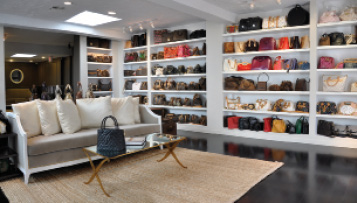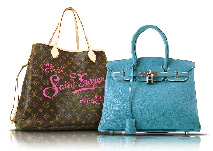- Home
- Media Kit
- Current Issue
- Past Issues
- Ad Specs-Submission
- Ad Print Settings
- Reprints (PDF)
- Photo Specifications (PDF)
- Contact Us

![]()
ONLINE

Resale in the Luxury Market
Editors' Note
Sarah Davis started Fashionphile in 1999 as a way to pay off her law school loans. She began buying and selling pre-owned luxury bags on eBay and quickly became the site’s go-to designer detective, and fashionistas in the U.S. and abroad started seeking her out for the real deal on pre-owned designer bags.
Company Brief
Founded in 2006 and located just off Rodeo Drive in Beverly Hills, California, Fashionphile LLC (www.fashionphile.com) is the largest pre-owned luxury handbag business in the country. It is a family-owned and operated business started in 1999 by Sarah Davis. The brand features handbags from Louis Vuitton, Chanel, Gucci, and Prada, among others at a significant discount. Customers can buy, sell, or trade their bags through Fashionphile. The international brand has been named one of Entrepreneur magazine’s “100 Brilliant Ideas of 2010” and an Inc. 500 company, rising from $600,000 in sales in 2006 to over $4 million in 2009.
What did you see in the market that made you feel the timing was right for Fashionphile?
Davis: What is fascinating about resale in the luxury handbag market is that there are so many brands that don’t discount at all. Louis Vuitton and Hermés have no sales ever, and there are no outlets. You bring back an irregular bag and rather than sell that bag to someone else at a discount, they have a slash-and-trash policy. A lot of the companies we resell have been around since the 1800s, and they have been able to maintain their place in the market.

Fashionphile’s Beverly Hills store
What that does is fuel a really healthy resale market, because the only way to get a Louis Vuitton bag for less than retail, unless you work for the company, is to get it on the secondary market.
That is what brought me into the business, other than the fact that I love bags. Finding something to sell is natural for me, and I found this by selling my own bags and finding it so interesting that I could buy a bag this year and sell it later for very close to retail.
Do you foresee your product line growing, and how do you define the right brands to be working with?
Davis: We look at those really exclusive brands that don’t do a lot of discounting but that are maintaining their value. Even though you may have paid a pretty hefty initial purchase price, if there is a lot of discounting going on, it hurts your chances as far as the resale of that item goes.
However, a brand like Coach is the gateway drug to luxury bags, because buyers often start out with a Coach bag before upgrading to a more expensive luxury bag. Coach brings in people who then realize they can get a Louis Vuitton bag for $450, so we’re introducing them to the luxury handbag market.
Once they come to Fashionphile and start dabbling in these higher-end luxury bags, they then go to a Chanel boutique and lay down the big bucks for a brand new bag because they have been introduced to it. We’re part of that accessible luxury chain.

Samples of pre-owned bags
available through Fashionphile
How did you focus on authenticity from the beginning?
Davis: That for us is the sticking point. Once we decide we want to take on a new brand, the first thing we do is actively search out authentication help for that brand.
We have in-house authenticators for most of the brands we sell, and we have two authenticators for every brand.
It used to be the fakes were an easy spot. Today, the fakes are made by these counterfeiters that are ripping apart the authentic bags and doing side-by-side comparisons, so there are nuanced differences that require a skilled authenticator to point out. We can’t risk having fakes, so we’re very conservative about what we accept.
How did the evolution of the boutique in Beverly Hills come about, and why did you feel it was important to have that brick-and-mortar structure?
Davis: While the boutique does sell some bags for us, we sell our bags all over the world via the Internet.
But we are constantly aiming to get more and bigger and better bags.
When Ben was starting UCLA Business School in Los Angeles, I thought about moving the business to L.A. and trying to make a real effort to get local bags in on consignment.
That is when the business went from something I used to pay off my law school loans to something with huge potential.
In Beverly Hills, we had a warehouse structure where we were selling everything online.
But people were bringing bags to us and their jaws were dropping as they were seeing boxes of Chanel and Louis Vuitton, and they wanted to look. So we decided to reorganize our inventory on display shelves and in an area that is more retail-oriented without being a retail spot.
We still sell 70 percent of our inventory on our Web site, another 20 percent on eBay; 5 percent is sold out of our boutique.
But the boutique helps people to see what we do and inspires them to bring more things in and recognize that we’re not fly-by-night.
We did a survey of the people on our mailing list, and when asked why they trust us, many people said it’s because we are based in Beverly Hills.
Has it become a more competitive landscape, and will it be more challenging going forward to differentiate in the space?
Hemminger: Starting out, we were the only ones. Many people have tried to start carbon copies of our business, and a couple have become noticeable in the marketplace.
We now have to compete with them on ad words for Google and advertising space on handbag blogs.
Our differentiation has been volume and street credibility in handbags. We have a good clientele, and we’re talked about more often than other companies among handbag buyers.
So we have to build in the volume and keep ourselves authoritative in the marketplace while the others are trying to come in and copy us.
Davis: We’re trying to focus on maintaining our position in the market and growing our reputation as the largest, most diverse, and most talked about handbag buyer and seller.
Why go to a site where there are 50 or 60 bags when you can come to us and know there are 1,000 or more. People also trust that we can sell their bags because they see that we have a lot of bags but that our inventory is always moving.•